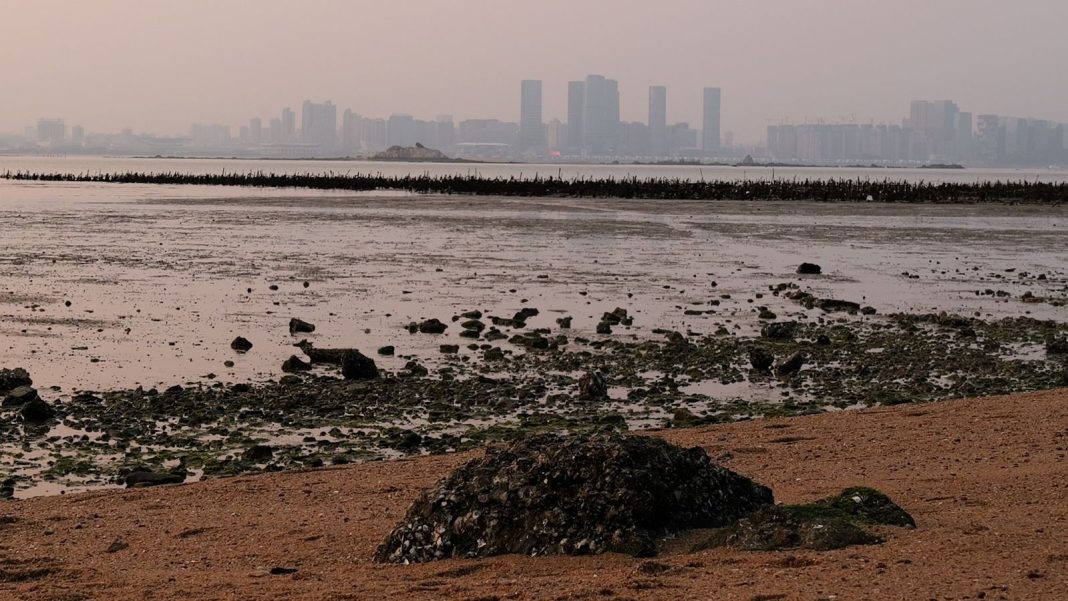There is a long queue of people waiting to board the ferry from the coastal city of Xiamen in southeast China.
There are families with children, a number of older people and many others lugging huge suitcases laden with cheap goods.
They board quickly and take seats inside the small boat, there’s a sense many of them take this trip regularly.
Their journey is a short one, fewer than 10 miles lasting only about half an hour, but they are passing between two places with an increasingly tense and fractious relationship: China and Taiwan.
Indeed, this ferry links Chinese Xiamen with the Kinmen Islands, an outlying territory of Taiwan situated over 100 miles from the Taiwanese mainland, but just a few miles from China’s coast.
China-Taiwan map
They are so close that even on a misty day you can see one from the other, at low tide the very closest points are a mere two kilometres apart and there is a history of defectors successfully swimming between them.
But these islands and the short journey between them offer a vantage point of sorts, a perspective on the complex, intertwined relationship between China and Taiwan, the struggle over what their future should be and, crucially, the threat that one poses to the other.
Those issues are coming into sharp focus this week as Taiwan heads to the polls to pick a new president.
More on this story:
The contest China calls a choice between war and peace
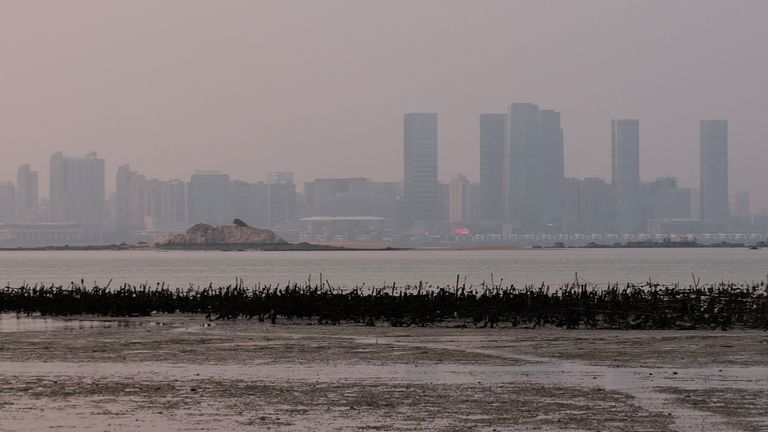
Xiamen is seen from the Kinmen Islands
‘A choice between war and peace’
As a self-governing island that China views as a breakaway province, elections are always contentious, and this time promises to be no exception.
The current ruling party’s candidate, Lai Ching-te, is most likely to win, his Democratic Progressive Party (DPP) takes the hardest line against China, and with a history of making pro-independence statements, his election will be highly provoking to Beijing.
In the run-up China has maintained military pressure on Taiwan such as flying warplanes towards the island, while one official framed the vote as a choice between “war and peace”.
On Kinmen itself an awareness of its vulnerability is everywhere.
The beaches are lined with historic defensive spikes and bunkers, there are multiple imposing army bases and military trucks are a regular sight on the roads.
Experts say that while Kinmen would not be a key focus of any Chinese invasion, it would likely be a first port of call.
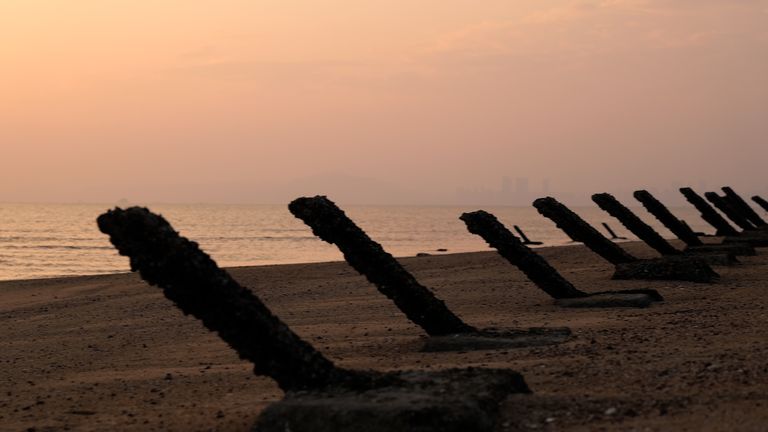
Historic defences on a beach on Taiwan’s Kinmen Islands, just across the water from China
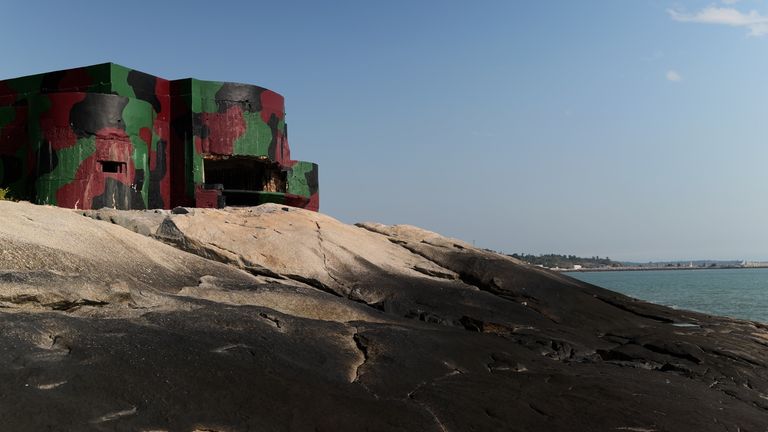
An historic bunker on a beach on the Kinmen Islands, which could be re-used if China invaded
‘People are unhappy and angry’
This is what 36-year-old Wenchi Lan believes. He previously served in the army and is now a keen follower of military issues and an expert on Kinmen’s historic military sites.
He thinks that while war isn’t imminent, it is possible and shows us a bag he has prepared for that eventuality, including torches, medicine and a wallet stuffed with Chinese currency to “pay-off the invading troops”, he says.
As a young voter his support lies with Lai Ching-te, the DPP, he believes, is the party most likely stand up to the Chinese threat.
“Emotionally due to the constant state of intimidation, people are definitely unhappy and angry,” he says, “China’s continuous showing of military threat is counter-productive.
“The threat from China directly influences my families’ assessment of the candidates and their attitudes towards cross-strait relations.
“Older people tend to believe that the country should prioritise peace over the nation, consider peace first and then the nation second.”
He continues: “However my family and I believe the order should be reversed, we think the nation should come first and then we can discuss how to engage in equal exchanges.”
Watch: Moment Chinese warship nearly hits US destroyer in Taiwan Strait

Wenchi Lan has prepared an emergency kit for him and his wife for if China invades
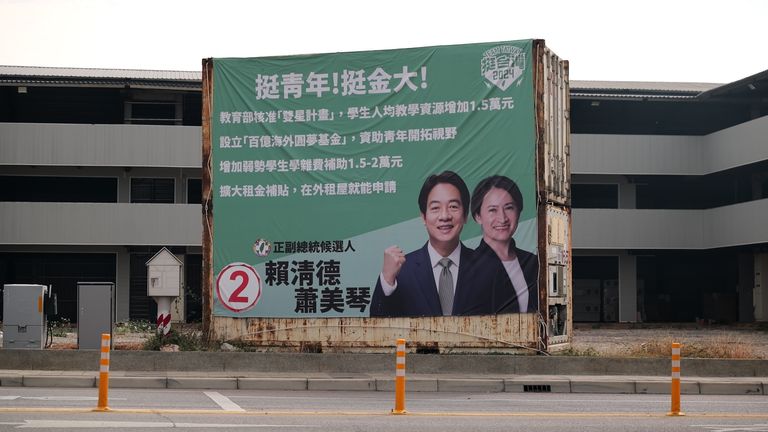
Taiwan’s current vice president and DPP candidate for president Lai Ching-te alongside his running mate Hsiao Bi-khim on a campaign poster
‘Both Taiwan and the mainland belong to Chinese culture’
But the views of many on Kinmen are a little more nuanced, heavily influenced by the deep historical as well as cultural and linguistic ties with the mainland.
In fact many here continue to see themselves as culturally Chinese, “I am a Fujian person”, one woman proudly tells us.
And that closeness means that many here vote for the opposition KMT party which advocates more dialogue and a closer relationship with Beijing.
This is also a place where Chinese efforts to win the hearts and minds of Taiwanese people have made significant inroads.
State supported cultural exchanges are just one tactic.
Shih Tsung Chen’s choir has taken part in such exchanges, journeying to the mainland to perform.
At the small church in Kinmen where they gather to practice a mixture of Taiwanese and Chinese cultural songs, he tells us that most people here want a relationship with China, but one based on peace.
“Politically, we belong to Taiwan, but in terms of culture, I feel that we are quite close to the mainland. This closeness may even surpass Taiwan itself,” he says.
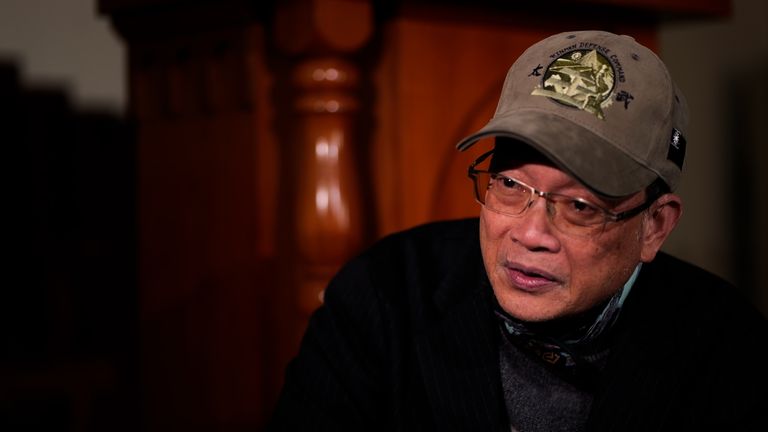
Shih Tsung Chen is critical of the ruling DPP for ’emphasising Taiwan’s independence’
In fact when it comes to rising tensions with China, he blames the DPP.
“Taiwan’s main issue now is because the ruling party has been emphasising Taiwan’s independence,” he says.
“I think that the division between the two sides, Taiwan and the mainland, is not correct. Both Taiwan and the mainland belong to Chinese culture. So, fundamentally, trying to separate them is not right. From my perspective, Taiwan’s ruling party bears a larger responsibility.”
A KMT victory might reduce tensions across the strait for a time, but it almost certainly won’t resolve the underlying disagreement.
It is unclear at the moment how China will respond to the vote, but any escalation of tensions may well be felt first by the people of Kinmen.


